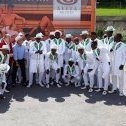Search the Community
Showing results for 'Nigger'.
-

Remembering hearing wildly racist stuff from regular folks
Art Vandelay replied to Brisketexan's topic in Daily Texan
Growing up in a small town in North Texas in the 1970s & 80s, I heard all the ones mentioned in this thread pretty regularly, including the eeny meeny, miney, moe rhyme. Everyone used the term "wetback", including (and maybe especially) the hispanic kids. One kid in middle school, who was well-liked and popular, was half-white/half-black. Everyone called him Higger or Wigger, to his face, but not maliciously (as weird as that sounds). If it bothered him, he didn't show it, he just laughed along. When I was a kid, the n-word was forbidden in our house, and I never heard my parents use it. Unfortunately, in my Dad's grumpy old age, he has let one fly now and again. My grandpa, an Irish-Catholic who lived in Kansas City, used to refer to one of his neighbors as a "good nigger." He genuinely like the guy, but it was as if he felt it necessary to qualify it -- i.e., "a good guy (for a black person)." Not long after Obama was elected, my other grandpa remarked to me that "all black and brown people are the same, and now we've got one in the White House." My grandma, German through and through, once said to me "Can you believe Joe Lieberman could be vice president?" I replied with something like "well, what's so bad about him, grandma?" She stared at me for a few seconds, wide-eyed, then leaned in close and whispered: "He's a Jew!!" -
I've pointed it out before, but it bears repeating: In my lifetime, the percentage of Americans who identify as "non-Hispanic whites" has dropped from 85% to 63%. It is projected to drop below 50% in 2043. Racism and the palpable reality of no longer being the majority race in the US drives almost all Republican support in the heartland. Abortion? Nah. That's a convenient place for most to hang their hat because it's less onerous to claim one is for the sanctity of life than admit one hates niggers and spics. Fifty years prior to Roe V Wade, there was a concerted effort among many Christian leaders to help provide MORE access to abortion. The Catholic Church was opposed to Roe V Wade, but protestant leaders were largely silent. Even the Southern Baptists passed resolutions as late as 1976 affirming the rights of women to have abortions. The tide started to turn as desegregation became the rule, not the exception, even though segregation in public schools had been illegal since 1954. Evangelicals like Jerry Falwell created private segregated schools, but faced a stiff argument that they could not hold tax-exempt status, because they were discriminating on the basis of race. They needed to grow support in order to maintain a segregated society, and landed on abortion as the issue around which they could rally support. In the end, it all comes down to race and racism. That's it. At the top, it's about whatever it takes to maintain power and grow wealth, but the most common weapon to keep the base in line is their fear of black and brown people.
-
I might have told this story on this site or the old one... Summer after HS I had to deliver my dad's late brother's car from Houston up to my dad in Nashville...I took our HS class mate "Bob Avila" with me. You remember "Bob," don't you? Medium-dark skinned Mexican brotha with a bushy Mexi-mullet at the time? Anyway, we got through a night out in New Orleans without incident and then drove to Nashville, where I, despite having loved there for ten years as a kid, got lost as fuck. It was around midnight, and I was on the wrong Old Hickory Blvd, about ten miles from my dad's house. (There are four Old Hickorys in Nashville, not connected, all major thoroughfares.) So anyway we are driving around lost on the Old Hickory in this convertible POS car my dad should have just sold in Houston. I'm blanking on the make / model -- it was a domestic two-door with a shitty engine and ugly as homemade sin... And the Metro Nashville PD lit me up. I pulled over and all hell broke loose. Two, three, four, five cop cars..."Bob" and I in the back seat of one of them while the ransacked my car. We hadn't been drinking or anything like that...I was just lost on Old Hickory Blvd. Anyway, after what seemed like an hour in the back seat of that cruiser one of the cops gave us the deal. There had been a robbery in the area and the suspects matched our description. "We thought you were a nigger," the cop said to Bob.
-
Black Twitter/Black Social Media has basically done one of two things with this today: 1.) Proclaim that it’s no big deal because trump has said more shit that is way more racist and has said it more frequently including just yesterday when he was praising Henry Ford. 2.) stated they hate Joe Biden and this is an example why—BUT they will still vote for him in November There has been a small—and I do mean small—fraction of Blacks online who said this will cause them to not vote for him, but that small percentage has been suckered into trump before this thanks to the Candace Owens and Kanye types. Hell Charlamagne still stuck up for him after this interview, and Charlamagne is fucking wack. The hashtag that was floating around twitter most of the day is clearly the Russian bots and White Republicans who don’t give two shits about Blacks and instead just want the Black votes for trump because they know he’s losing. My parents are Black Christians and lean conservative but are Dems. I asked my mom about it today (granted she’s probably had some wine) but her words were “he’s a dumbass for saying that, but I’ll still be there when the polls open to vote for him.” Black churches will still be preaching Vote Biden from here until November. This hasn’t changed a damn thing and it’s funny watching people who aren’t Black tell me what is and isn’t racist, and I’m the one who has been called a nigger multiple times by people who are not my own race.
-

Pancho gets pulled over by a Lafayette, LA narcotics officer
Judge Roybeanbag replied to Pancho's topic in Daily Texan
One guys racist rant. So I was, I think about 10 years old or so. This would have been around 1975, I guess. I went to school with a bunch of black kids, the only other school in town was St Mary’s catholic school, although my family was catholic my dad was a schoolteacher so I went to public school. Anyway one of my classmates was a kid named Kenny Johnson. Half of his face was a scar, because we burned trash in barrels and a hairspray can or something had exploded and burned him. The town I grew up in was divided, blacks were on one side of the canal, whites on the other. Kind of like I-35 in Austin in the old days. Anyway one day I went with Kenny to his house to play football. We had a good time. I went inside. There were bunk beds in there to the ceiling where he and his brothers slept. Cramped as fuck. His mother brought me a drink of water, in a tin cup, that looked like it had been shared between everyone, because it had. That was all cool. I had a good time. The next day, when I was walking home from school, i got the dreaded shit. “Hey nigger lover, I heard you spent some time in shantytown “. A belt got pulled out. I got hit in the head with a basketball, whipped with a belt, and kicked with some shitheeled boot. I went on home crying, got over it, and I won’t repeat what my old man said to me about those boys. He drove a school bus during integration and didn’t brook any bullshit. I wish sometimes I had his patience. -

Racism and the Greek System (South & Texas)
Pancho replied to MaybeACoordinator's topic in Cloak Room
There is a lot of interesting research surrounding fraternities and sororities and Whiteness. A lot of them are qualitative, which is my wheelhouse. You can find a few of them for free on Google Scholar. Some of the research basically is White frat members believing while they may make a "little racist joke" here or there, they don't consider themselves racist. (Like with some White people, they only believe themselves to be racist if they openly use the word nigger or if they advocate for the rise of slavery of Blacks. But because they don't do that, they don't think they are racist.) And to their credit, there are some in the focus groups of the research who believe their White frats could benefit from more diverse memebers. A lot of research I read in my doctoral program centered around fraternities and sororities enhancing "brotherhood and sisterhood" so that is one influence as to why they may not appeal to someone of a different race. That doesn't mean they don't want someone of a different race and wouldn't be accepting, but their experiences with someone of a different race doesn't scream "you're my brother/sister" like someone else who is also White and wealthy/semi-wealthy. This is what BT was saying with the bourgeois. I don't know that I'd connect the bourgeois to Black fraternities and sororities and instead argue their connection centers around similarities in racial experiences as well as economic status. (The anti-bourgeois) I actually think an all-White Greeek frat would be more open to accepting a Black member than an all-White Greek sorority, and I'm surprised I'm making that assertion honestly considering what we know about communication styles between men and women. I just don't think I would ever see a Black Chi-O, but I also don't know that I would see a White AKA. I feel like I've seen White guys in Black frats before, but not at UT. I know I've definitely seen White guys in Black frats at HBCUs, but that's a totally different story. -
Banned Books Week. I guess you haven't heard of it. Look man, you can say damn near whatever you want and nobody is going to throw you in jail. However, if you go around calling people faggots, niggers, kikes, spics or a host of other names that were just fine and dandy a while back it is probably going to cost you some money and possibly your job. If you want to do it that's fine, I am not going to stop you but I am going to avoid doing business with you and there is a strong chance you will get some repercussions from society. Guess you missed this down in Katy Big Censorship Stories of 2017 When The Hate U Give was removed from all school libraries in the Katy Independent School District (Texas), a 15-year-old student gathered 3,700 signatures on an online petition; spoke out at a school board meeting; and started a book club about the YA novel. Author Angie Thomas called her “the real Starr Carter.” The book was returned to high school libraries and can only be checked-out with parental consent. Learn more on the Intellectual Freedom Blog. pic is from this event More than 150 people attended the West Chicago Public Library (Illinois) board meeting to debate the inclusion of This Day in June by Gayle Pitman in the youth collection. With support from the conservative Illinois Family Institute, a formal request for reconsideration was submitted to remove or relocate the book to the adult section so children won’t be exposed to LGBT imagery. The board voted 6-1 to retain the picture book in the youth collection. Learn more on the Intellectual Freedom Blog. And that's just a sample. That isn't the left wanting to ban books. It isn't the left that burns Debil Music in the parking lot. Last year buddy saw a rise in challenges to books. But, if you wanna go align yourself with folks that can't stand the idea of treating another human being with respect because they have a different sexual orientation than themselves, well go for it.
-

Dallas Bartender Going Viral For Beating Up Woman
Pancho replied to Vic Mackey's topic in Daily Texan
A lot of black people don't like Shaun King, and I can understand why. Black people do stuff all the time to show their anger over black on black crime. You just rarely, if ever, hear about them. I don't know why this isn't highlighted more in society, but it's not. My grandma lived in Souf Oak Cliff. She was in education for 50+ years before her death. Her and other black women tried to do so many things during that time frame to highlight the issue of thug life not being they way, which (in my opinion) is what leads to most black/black crime. For blacks (and more specifically black males) to curb this issue, it starts when they are younger. And yes, there have been plenty of stories of grown black males giving back or going back into the hood to become role models to prevent younger black males from going into thug life, which typically leads to black/black crime. But, you never hear those stories. You'd have to ask yourself why though. Nonetheless, I think that comment got way off track of the orinigal post. He called her a nigger, with the hard r. I think you can surmise if this was a hate crime or not. What we don't know is how he would have reacted if it was a white woman. But I can see what you're saying here. I've had a few friends who always told me they'd never use the n-word. But once they got some drank in them, it came right out easy as pie. Do I think those white friends are racist? Ehh, I still hang out with them. But I often wonder how that word could come out so easliy for them when drunk. This could be the case here. I wouldn't be surprised to see him make a statement saying he's not racist and would never be, and he might not be. But that's not my call to make though. People don't want to have Deep Ellum shut down literally rather they are threatening a protest of businesses and to not spend money at those establishments. That's what I gathered from reading the article. -
look yall, i don't really think this is hard. there are certain hard slurs that are going to get you the old suspension. everyone knows these. one of them: faggot, did not used to be bannable. as a matter of fact, i used it up until about 15 years ago (? somewhere around there? i dunno, i'm getting old) myself to express extreme displeasure at a person while driving. i rationalized it, of course, by saying things like "i don't mean that person is gay" or "i don't mean that being gay makes one a fucking terrible dumbass on the road" but the truth of it was i was using a hateful word in a hateful way. i had too many gay friends in my life to be doing such an immature thing. so i made a conscious decision to stop saying it. recently, i've made more conscious decisions to be more careful about gender language, like using the words bitch and the like. not everyone needs to do that, and i'm not trying to fish for compliments because fuck you, but it's a thing i'm working on. i think "retarded" is such a word. i used it for years and years, up until recently, even. probably less than a decade ago i stopped. why? because i knew too many other parents with developmentally different kids. it was the exposure and the personal connections that changed how i thought about that stuff. my dad was a racist with the known "good guys" caveat. he didn't mean nigger to mean all black people. just all the black people except the known good ones. and fuck the rest if they couldn't take a joke. that was his mindset. that is not a healthy mindset. it's okay to change. you don't have to resist all change. change can be good. you'll feel better if you stop using the word retard. i can't explain it, but it's true. i feel better trying not to say things like "stop being a little bitch." i don't always succeed, but i'm trying to be better. and i think that's worth effort, being a little bit better each day, if we can. if someone tells you that you've offended them, you can immediately do one of two things: 1) tell them to go fuck themselves you'll say what you want, which is okay, or 2) think about it for a minute, take the person at face value that they are offended, and say "ok, sorry about that, i didn't know that was offensive, i won't use that word for that again." the first costs a ton of emotional energy, the second costs a little tiny bit of effort and no other real energy other than trying to be more mindful of people around you. THE HORROR.
-
At least there was no test. From Introduction, Master of the Senate: The room on the first floor of the Barbour County Courthouse in the little town of Eufaula, Alabama, was normally the County Clerk’s Office, but after it had closed for the day on August 2, 1957, it was being used by the county’s Board of Registrars, the body that registered citizens so they could vote in elections—not that the Board was going to register any of the three persons who were applying that day, for the skin of these applicants was black. It was not a large room, and it was furnished very plainly. Its walls, white and in need of a fresh coat of paint, were adorned only by black-and-white photographs of former county officials. Against the rear wall stood a row of battered old filing cabinets that contained records of deeds and mortgages and applications for driver’s licenses, and in front of the cabinets were six small, utilitarian gray metal office desks, each with a small, worn chair. Then there was a waist-high wooden counter at which people doing business with the County Clerk’s Office usually stood. Today, the three registrars were standing behind the counter, and the applicants were standing in the bare space in front of it. No one offered them a chair, and the registrars didn’t bother to pull up chairs for themselves, because the hearing wasn’t going to take very long. Trying to register to vote took courage for black people in Alabama in 1957, even when physical intimidation or violence wasn’t employed to discourage them—as it often was. Everyone knew about black men who had registered and who shortly thereafter had been told by their employers that they no longer had a job, or about black farmers who, the following spring, went to the bank as usual for their annual “crop loan”—the advance they needed to buy the seed for the crop they were planning to plant that year—only to be informed that this year there would be no loan, and who had therefore lost their farms, and had had to load their wives and children into their rundown cars and drive away, sometimes with no place to go. Indeed, David Frost, the husband of Margaret Frost, one of the three applicants that August day, would never forget how, after he himself had registered some years before, a white man had told him that “the white folks are the nigger’s friend as long as the nigger stays in his place,” but that “I had got out of my place if I was going to vote along with the white man,” and how, for months thereafter, instead of calling him “David” or “Boy” as they usually did, white people called him by the word he “just hated, hated”: “Nigger”—pronounced in Alabama dialect, “Nigra”—and how, when they learned he was planning to actually vote, a car filled with men had stopped in front of his house one night and shot out the porch lights, and how, cowering inside, he had thought of calling the police, until, as the car drove away, he saw it was a police car. And of course there was the humiliation of the registration hearings themselves. Many county Boards of Registrars required black applicants to pass an oral test before they would be given the certificate of registration that would make them eligible to vote, and the questions were often on the hard side—name all of Alabama’s sixty-seven county judges; what was the date Oklahoma was admitted to the Union?—and sometimes very hard indeed: How many bubbles in a bar of soap? The Barbour County registrars used a less sophisticated technique. They asked more reasonable questions—the names of local, state, and national officials—but if an applicant missed even one question, he would not be given the application that had to be filled out before he could receive a certificate, and somehow, even if a black applicant felt sure he had answered every question correctly, often the registrars would say there was one he had missed, although they would refuse to tell him which it was. Margaret Frost had already experienced this technique, for she had tried to register before—in January of 1957—and forty years later, when she was an elderly woman, she could still remember how, after she had answered several questions, the Board’s chairman, William (Beel) Stokes, had told her she had missed one, adding, “You all go home and study a little more,” and she could still remember how carefully blank the faces of Stokes and his two colleagues had been, the amusement showing only in their eyes. Nonetheless, despite the humiliation of her earlier hearing in the County Clerk’s Office, Mrs. Frost—a soft-spoken woman of thirty-eight—had returned to that dingy room to stand in front of that counter again. “I was scared I would do something wrong,” she recalls. “I was nervous. Shaky. Scared that the white people would do something to me.” But, she says, “I wanted to be a citizen,” truly a part of her country, and she felt that voting was part of being a citizen. “I figure all citizens, you know, should be able to vote.” In the months since January, she had, with her husband asking her questions, studied, over and over, all the questions she felt the Board might ask, until she thought she would be able to answer every one. And on August 2, she put on her best clothes and went down to the courthouse again. As it turned out, however, the diligence with which Margaret Frost had studied turned out to be irrelevant, because the Board examined her and the two other applicants as a group, and one of them wasn’t as well prepared as she. When she asked Stokes for an application, he said, “There’s twelve questions you have to answer before we give you an application.” He asked just two. Mrs. Frost answered them both correctly, as did one of the other applicants. But the third applicant answered the second question incorrectly, and Stokes told them that therefore they had all failed. “You all go home and study a little more,” he said. Margaret Frost left the room quietly, and she never sued or took any other legal action to try to force the Board to register her. Doing so, however, would almost certainly not have helped. In August, 1957, black Americans in the South who were denied the right to vote, and who asked a lawyer (if they could find a lawyer who would take their case) what law would assist them to do so, were informed that there was no such law—and that information was accurate. Summarizing the situation, a study made that same year by the United States Department of Justice concluded that “There is no adequate legal remedy” for a person who had been denied a registration certificate by a county Board of Registrars. The scene that had occurred in the Eufaula courthouse was not an unusual one in the American South in 1957. After the Civil War almost a century before, there had been an attempt to make black Americans more a part of their country, to give them the basic rights of citizens—which included, of course, a citizen’s right to vote—and in 1870, the Fifteenth Amendment to the Constitution had supposedly guaranteed that right, forbidding any state to “deny or abridge” the “right of citizens . . . to vote” because of their race or color. But the amendment proved to be an insufficient guarantee in the eleven southern states that had seceded from the Union and formed the rebel Confederacy; specific laws to give the amendment force and make it meaningful—federal laws, since there was no realistic possibility that any southern state would pass an effective statute—were going to be necessary. During the eighty-seven years since the Fifteenth Amendment had been ratified, scores, indeed hundreds, of proposed federal laws had been introduced in the Congress of the United States to ensure that black Americans would have in fact as well as theory the right to vote. Not one of these bills had passed. And in Barbour County, in which there were approximately equal numbers of black Americans and white Americans, out of 7,158 blacks of voting age in 1957, exactly 200—one out of thirty-five—had the right to vote, while 6,521 whites had that right. In Alabama as a whole, out of 516,336 blacks who were eligible to vote, only 52,336—little more than one out of ten—had managed to register. For the eleven southern states as a whole, out of more than six million blacks eligible to vote, only 1,200,000—one out of five—had registered. And of course, even those blacks who had registered to vote often didn’t dare go to the polls to cast ballots, because of fear of violence or economic retaliation. In 1957, there were scores of counties in the South which had tens of thousands of black residents, but in which, in some elections, not a single vote had been cast by a black.
-
From the introduction to Caro's Master of the Senate (3rd book in LBJ biography). I remember listening to this as a book on tape when I was driving in Arkansas. Powerful stuff. (The passage then switches to Washington, DC) The room on the first floor of the Barbour County Courthouse in the little town of Eufaula, Alabama, was normally the County Clerk’s Office, but after it had closed for the day on August 2, 1957, it was being used by the county’s Board of Registrars, the body that registered citizens so they could vote in elections—not that the Board was going to register any of the three persons who were applying that day, for the skin of these applicants was black. It was not a large room, and it was furnished very plainly. Its walls, white and in need of a fresh coat of paint, were adorned only by black-and-white photographs of former county officials. Against the rear wall stood a row of battered old filing cabinets that contained records of deeds and mortgages and applications for driver’s licenses, and in front of the cabinets were six small, utilitarian gray metal office desks, each with a small, worn chair. Then there was a waist-high wooden counter at which people doing business with the County Clerk’s Office usually stood. Today, the three registrars were standing behind the counter, and the applicants were standing in the bare space in front of it. No one offered them a chair, and the registrars didn’t bother to pull up chairs for themselves, because the hearing wasn’t going to take very long. Trying to register to vote took courage for black people in Alabama in 1957, even when physical intimidation or violence wasn’t employed to discourage them—as it often was. Everyone knew about black men who had registered and who shortly thereafter had been told by their employers that they no longer had a job, or about black farmers who, the following spring, went to the bank as usual for their annual “crop loan”—the advance they needed to buy the seed for the crop they were planning to plant that year—only to be informed that this year there would be no loan, and who had therefore lost their farms, and had had to load their wives and children into their rundown cars and drive away, sometimes with no place to go. Indeed, David Frost, the husband of Margaret Frost, one of the three applicants that August day, would never forget how, after he himself had registered some years before, a white man had told him that “the white folks are the nigger’s friend as long as the nigger stays in his place,” but that “I had got out of my place if I was going to vote along with the white man,” and how, for months thereafter, instead of calling him “David” or “Boy” as they usually did, white people called him by the word he “just hated, hated”: “Nigger”—pronounced in Alabama dialect, “Nigra”—and how, when they learned he was planning to actually vote, a car filled with men had stopped in front of his house one night and shot out the porch lights, and how, cowering inside, he had thought of calling the police, until, as the car drove away, he saw it was a police car. And of course there was the humiliation of the registration hearings themselves. Many county Boards of Registrars required black applicants to pass an oral test before they would be given the certificate of registration that would make them eligible to vote, and the questions were often on the hard side—name all of Alabama’s sixty-seven county judges; what was the date Oklahoma was admitted to the Union?—and sometimes very hard indeed: How many bubbles in a bar of soap? The Barbour County registrars used a less sophisticated technique. They asked more reasonable questions—the names of local, state, and national officials—but if an applicant missed even one question, he would not be given the application that had to be filled out before he could receive a certificate, and somehow, even if a black applicant felt sure he had answered every question correctly, often the registrars would say there was one he had missed, although they would refuse to tell him which it was. Margaret Frost had already experienced this technique, for she had tried to register before—in January of 1957—and forty years later, when she was an elderly woman, she could still remember how, after she had answered several questions, the Board’s chairman, William (Beel) Stokes, had told her she had missed one, adding, “You all go home and study a little more,” and she could still remember how carefully blank the faces of Stokes and his two colleagues had been, the amusement showing only in their eyes. Nonetheless, despite the humiliation of her earlier hearing in the County Clerk’s Office, Mrs. Frost—a soft-spoken woman of thirty-eight—had returned to that dingy room to stand in front of that counter again. “I was scared I would do something wrong,” she recalls. “I was nervous. Shaky. Scared that the white people would do something to me.” But, she says, “I wanted to be a citizen,” truly a part of her country, and she felt that voting was part of being a citizen. “I figure all citizens, you know, should be able to vote.” In the months since January, she had, with her husband asking her questions, studied, over and over, all the questions she felt the Board might ask, until she thought she would be able to answer every one. And on August 2, she put on her best clothes and went down to the courthouse again. As it turned out, however, the diligence with which Margaret Frost had studied turned out to be irrelevant, because the Board examined her and the two other applicants as a group, and one of them wasn’t as well prepared as she. When she asked Stokes for an application, he said, “There’s twelve questions you have to answer before we give you an application.” He asked just two. Mrs. Frost answered them both correctly, as did one of the other applicants. But the third applicant answered the second question incorrectly, and Stokes told them that therefore they had all failed. “You all go home and study a little more,” he said. Margaret Frost left the room quietly, and she never sued or took any other legal action to try to force the Board to register her. Doing so, however, would almost certainly not have helped. In August, 1957, black Americans in the South who were denied the right to vote, and who asked a lawyer (if they could find a lawyer who would take their case) what law would assist them to do so, were informed that there was no such law—and that information was accurate. Summarizing the situation, a study made that same year by the United States Department of Justice concluded that “There is no adequate legal remedy” for a person who had been denied a registration certificate by a county Board of Registrars. The scene that had occurred in the Eufaula courthouse was not an unusual one in the American South in 1957. After the Civil War almost a century before, there had been an attempt to make black Americans more a part of their country, to give them the basic rights of citizens—which included, of course, a citizen’s right to vote—and in 1870, the Fifteenth Amendment to the Constitution had supposedly guaranteed that right, forbidding any state to “deny or abridge” the “right of citizens . . . to vote” because of their race or color. But the amendment proved to be an insufficient guarantee in the eleven southern states that had seceded from the Union and formed the rebel Confederacy; specific laws to give the amendment force and make it meaningful—federal laws, since there was no realistic possibility that any southern state would pass an effective statute—were going to be necessary. During the eighty-seven years since the Fifteenth Amendment had been ratified, scores, indeed hundreds, of proposed federal laws had been introduced in the Congress of the United States to ensure that black Americans would have in fact as well as theory the right to vote. Not one of these bills had passed. And in Barbour County, in which there were approximately equal numbers of black Americans and white Americans, out of 7,158 blacks of voting age in 1957, exactly 200—one out of thirty-five—had the right to vote, while 6,521 whites had that right. In Alabama as a whole, out of 516,336 blacks who were eligible to vote, only 52,336—little more than one out of ten—had managed to register. For the eleven southern states as a whole, out of more than six million blacks eligible to vote, only 1,200,000—one out of five—had registered. And of course, even those blacks who had registered to vote often didn’t dare go to the polls to cast ballots, because of fear of violence or economic retaliation. In 1957, there were scores of counties in the South which had tens of thousands of black residents, but in which, in some elections, not a single vote had been cast by a black. https://www.randomhouse.com/knopf/authors/caro/excerpt.html
-
This is the intractable cultural heritage that we're up against. "The post–Civil War years were a moment of great peril for the emancipated, but also great promise. A stubborn coterie of Republican Radicals—longtime abolitionists and their allies—were not content to have simply saved the Union. They wanted to transform it: to make a nation where “all men are created equal” did not just mean white men. But the country was exhausted by the ravages of war. The last thing most white Americans wanted was to be dragged through a bitter conflict over expanding the boundaries of American citizenship. They wanted to rebuild the country and get back to business. John Wilkes Booth had been moved to assassinate Abraham Lincoln not by the Confederate collapse, but by the president’s openness to extending the franchise to educated Black men and those who had fought for the Union, an affront Booth described as “nigger citizenship.” Lincoln’s successor, Andrew Johnson, viewed the Radical Republican project as an insult to the white men to whom the United States truly belonged. A Tennessee Democrat and self-styled champion of the white working class, the president believed that “Negroes have shown less capacity for government than any other race of people,” and that allowing the formerly enslaved to vote would eventually lead to “such a tyranny as this continent has never yet witnessed.” Encouraged by Johnson’s words and actions, southern elites worked to reduce the emancipated to conditions that resembled slavery in all but name. Throughout the South, when freedmen signed contracts with their former masters, those contracts were broken; if they tried to seek work elsewhere, they were hunted down; if they reported their concerns to local authorities, they were told that the testimony of Black people held no weight in court. When they tried to purchase land, they were denied; when they tried to borrow capital to establish businesses, they were rejected; when they demanded decent wages, they were met with violence. In the midst of these terrors and denials, the emancipated organized as laborers, protesters, and voters, forming the Union Leagues and other Republican clubs that would become the basis of their political power. Southern whites insisted that the freedmen were unfit for the ballot, even as they witnessed their sophistication in protest and organization. In fact, what the former slave masters feared was not that Black people were incapable of self-government, but the world the emancipated might create. From 1868 to 1871, Black people in the South faced a “wave of counter-revolutionary terror,” the historian Eric Foner has written, one that “lacks a counterpart either in the American experience or in that of the other Western Hemisphere societies that abolished slavery in the nineteenth century.” Texas courts, according to Foner, “indicted some 500 white men for the murder of blacks in 1865 and 1866, but not one was convicted.” He cites one northern observer who commented, “Murder is considered one of their inalienable state rights.” The system that emerged across the South was so racist and authoritarian that one Freedmen’s Bureau agent wrote that the emancipated “would be just as well off with no law at all or no Government.” Indeed, the police were often at the forefront of the violence. In 1866, in New Orleans, police joined an attack on Republicans organizing to amend the state constitution; dozens of the mostly Black delegates were killed. General Philip Sheridan wrote in a letter to Ulysses S. Grant that the incident “was an absolute massacre by the police … perpetrated without the shadow of a necessity.” The same year, in Memphis, white police officers started a fight with several Black Union veterans, then used the conflict as a justification to begin firing at Black people—civilians and soldiers alike—all over the city. The killing went on for days. These stories began to reach the North in bureaucratic dispatches like Ruby’s, in newspaper accounts, and in testimony to the congressional committee on Reconstruction. Northerners heard about Lucy Grimes of Texas, whose former owner demanded that she beat her own son, then had Grimes beaten to death when she refused. Her killers went unpunished because the court would not hear “negro testimony.” Northerners also heard about Madison Newby, a former Union scout from Virginia driven by “rebel people” from land he had purchased, who testified that former slave masters were “taking the colored people and tying them up by the thumbs if they do not agree to work for six dollars a month.” And they heard about Glasgow William, a Union veteran in Kentucky who was lynched in front of his wife by the Ku Klux Klan for declaring his intent to vote for “his old commander.” (Newspapers sympathetic to the white South dismissed such stories; one called the KKK the “phantom of diseased imaginations.”) https://www.theatlantic.com/magazine/archive/2020/10/the-next-reconstruction/615475/
Football ... Basketball ... Baseball ... Other Sports ... Futbol ... 🤫995🤫 ... Gambling ... Movies & TV ... Music ... Hobbies ... Lulz ... Food & Travel ... Daily Texan ... Business and Markets ... Cloak Room ... Help ... For Sale ... Board Discussion ... Subscribe!... Donate!... COOKIE MONSTER!








